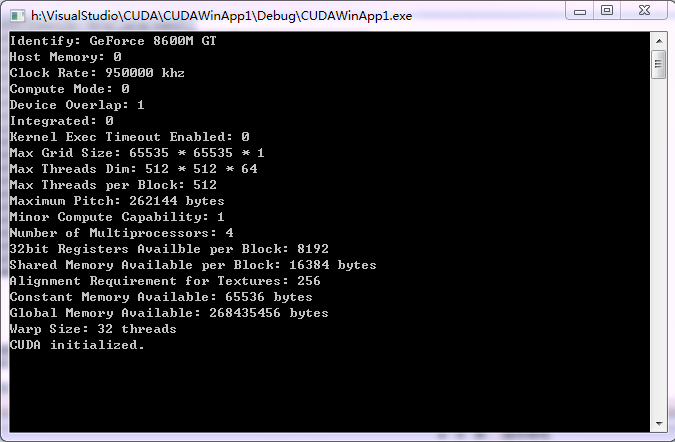首先介绍一下开发环境,Visual Studio 2008 + CUDA Wizard for Visual Studio. 确保显卡支持CUDA(GeForce 8系列之后,否则只能用模拟模式)并安装CUDA DDK及CUDA Toolkit。
安装完CUDA Wizard for Visual Studio之后,如果编译运行时出现"无法找到cutil32D.dll"的错误,则需要将安装的CUDA的sdk的路径加到系统环境变量中: #include <stdio.h>
#include <stdio.h>
 #include <cuda_runtime.h>
#include <cuda_runtime.h>

 bool InitCUDA()
bool InitCUDA()
 {
{
 int count;
int count;
 cudaGetDeviceCount(&count);
cudaGetDeviceCount(&count);
 if(count==0)
if(count==0)
 {
{
 fprintf(stderr,"There is no device.\n");
fprintf(stderr,"There is no device.\n");
 return false;
return false;
 }
}
 int i;
int i;
 for(i=0;i<count;i++)
for(i=0;i<count;i++)
 {
{
 cudaDeviceProp prop;
cudaDeviceProp prop;
 if(cudaGetDeviceProperties(&prop,i) == cudaSuccess)
if(cudaGetDeviceProperties(&prop,i) == cudaSuccess)
 {
{
 if(prop.major>=1)
if(prop.major>=1)
 {
{
 //枚举详细信息
//枚举详细信息
 printf("Identify: %s\n",prop.name);
printf("Identify: %s\n",prop.name);
 printf("Host Memory: %d\n",prop.canMapHostMemory);
printf("Host Memory: %d\n",prop.canMapHostMemory);
 printf("Clock Rate: %d khz\n",prop.clockRate);
printf("Clock Rate: %d khz\n",prop.clockRate);
 printf("Compute Mode: %d\n",prop.computeMode);
printf("Compute Mode: %d\n",prop.computeMode);
 printf("Device Overlap: %d\n",prop.deviceOverlap);
printf("Device Overlap: %d\n",prop.deviceOverlap);
 printf("Integrated: %d\n",prop.integrated);
printf("Integrated: %d\n",prop.integrated);
 printf("Kernel Exec Timeout Enabled: %d\n",prop.kernelExecTimeoutEnabled);
printf("Kernel Exec Timeout Enabled: %d\n",prop.kernelExecTimeoutEnabled);
 printf("Max Grid Size: %d * %d * %d\n",prop.maxGridSize[0],prop.maxGridSize[1],prop.maxGridSize[2]);
printf("Max Grid Size: %d * %d * %d\n",prop.maxGridSize[0],prop.maxGridSize[1],prop.maxGridSize[2]);
 printf("Max Threads Dim: %d * %d * %d\n",prop.maxThreadsDim[0],prop.maxThreadsDim[1],prop.maxThreadsDim[2]);
printf("Max Threads Dim: %d * %d * %d\n",prop.maxThreadsDim[0],prop.maxThreadsDim[1],prop.maxThreadsDim[2]);
 printf("Max Threads per Block: %d\n",prop.maxThreadsPerBlock);
printf("Max Threads per Block: %d\n",prop.maxThreadsPerBlock);
 printf("Maximum Pitch: %d bytes\n",prop.memPitch);
printf("Maximum Pitch: %d bytes\n",prop.memPitch);
 printf("Minor Compute Capability: %d\n",prop.minor);
printf("Minor Compute Capability: %d\n",prop.minor);
 printf("Number of Multiprocessors: %d\n",prop.multiProcessorCount);
printf("Number of Multiprocessors: %d\n",prop.multiProcessorCount);
 printf("32bit Registers Availble per Block: %d\n",prop.regsPerBlock);
printf("32bit Registers Availble per Block: %d\n",prop.regsPerBlock);
 printf("Shared Memory Available per Block: %d bytes\n",prop.sharedMemPerBlock);
printf("Shared Memory Available per Block: %d bytes\n",prop.sharedMemPerBlock);
 printf("Alignment Requirement for Textures: %d\n",prop.textureAlignment);
printf("Alignment Requirement for Textures: %d\n",prop.textureAlignment);
 printf("Constant Memory Available: %d bytes\n",prop.totalConstMem);
printf("Constant Memory Available: %d bytes\n",prop.totalConstMem);
 printf("Global Memory Available: %d bytes\n",prop.totalGlobalMem);
printf("Global Memory Available: %d bytes\n",prop.totalGlobalMem);
 printf("Warp Size: %d threads\n",prop.warpSize);
printf("Warp Size: %d threads\n",prop.warpSize);
 break;
break;
 }
}
 }
}
 }
}
 if(i==count)
if(i==count)
 {
{
 fprintf(stderr,"There is no device supporting CUDA.\n");
fprintf(stderr,"There is no device supporting CUDA.\n");
 return false;
return false;
 }
}
 cudaSetDevice(i);
cudaSetDevice(i);
 return true;
return true;
 }
}

 void main()
void main()
 {
{
 if(!InitCUDA())
if(!InitCUDA())
 {
{
 getchar();
getchar();
 return;
return;
 }
}
 printf("CUDA initialized.\n");
printf("CUDA initialized.\n");
 getchar();
getchar();
 }
}



安装完CUDA Wizard for Visual Studio之后,如果编译运行时出现"无法找到cutil32D.dll"的错误,则需要将安装的CUDA的sdk的路径加到系统环境变量中:
例如C:\Program Files\NVIDIA Corporation\NVIDIA CUDA SDK\bin\win32\
下的
├─Debug
├─EmuDebug
├─EmuRelease
└─Release
几个目录都加入到系统环境变量Path中,这样才能在运行程序的时候找到相应的dll库。
然后就可以在VS下直接编译CUDA程序了(*.cu)。以下是一个CUDA初始化的程序。
 #include <stdio.h>
#include <stdio.h> #include <cuda_runtime.h>
#include <cuda_runtime.h>
 bool InitCUDA()
bool InitCUDA() {
{ int count;
int count; cudaGetDeviceCount(&count);
cudaGetDeviceCount(&count); if(count==0)
if(count==0) {
{ fprintf(stderr,"There is no device.\n");
fprintf(stderr,"There is no device.\n"); return false;
return false; }
} int i;
int i; for(i=0;i<count;i++)
for(i=0;i<count;i++) {
{ cudaDeviceProp prop;
cudaDeviceProp prop; if(cudaGetDeviceProperties(&prop,i) == cudaSuccess)
if(cudaGetDeviceProperties(&prop,i) == cudaSuccess) {
{ if(prop.major>=1)
if(prop.major>=1) {
{ //枚举详细信息
//枚举详细信息 printf("Identify: %s\n",prop.name);
printf("Identify: %s\n",prop.name); printf("Host Memory: %d\n",prop.canMapHostMemory);
printf("Host Memory: %d\n",prop.canMapHostMemory);  printf("Clock Rate: %d khz\n",prop.clockRate);
printf("Clock Rate: %d khz\n",prop.clockRate);  printf("Compute Mode: %d\n",prop.computeMode);
printf("Compute Mode: %d\n",prop.computeMode);  printf("Device Overlap: %d\n",prop.deviceOverlap);
printf("Device Overlap: %d\n",prop.deviceOverlap);  printf("Integrated: %d\n",prop.integrated);
printf("Integrated: %d\n",prop.integrated);  printf("Kernel Exec Timeout Enabled: %d\n",prop.kernelExecTimeoutEnabled);
printf("Kernel Exec Timeout Enabled: %d\n",prop.kernelExecTimeoutEnabled);  printf("Max Grid Size: %d * %d * %d\n",prop.maxGridSize[0],prop.maxGridSize[1],prop.maxGridSize[2]);
printf("Max Grid Size: %d * %d * %d\n",prop.maxGridSize[0],prop.maxGridSize[1],prop.maxGridSize[2]); printf("Max Threads Dim: %d * %d * %d\n",prop.maxThreadsDim[0],prop.maxThreadsDim[1],prop.maxThreadsDim[2]);
printf("Max Threads Dim: %d * %d * %d\n",prop.maxThreadsDim[0],prop.maxThreadsDim[1],prop.maxThreadsDim[2]); printf("Max Threads per Block: %d\n",prop.maxThreadsPerBlock);
printf("Max Threads per Block: %d\n",prop.maxThreadsPerBlock); printf("Maximum Pitch: %d bytes\n",prop.memPitch);
printf("Maximum Pitch: %d bytes\n",prop.memPitch); printf("Minor Compute Capability: %d\n",prop.minor);
printf("Minor Compute Capability: %d\n",prop.minor); printf("Number of Multiprocessors: %d\n",prop.multiProcessorCount);
printf("Number of Multiprocessors: %d\n",prop.multiProcessorCount);  printf("32bit Registers Availble per Block: %d\n",prop.regsPerBlock);
printf("32bit Registers Availble per Block: %d\n",prop.regsPerBlock); printf("Shared Memory Available per Block: %d bytes\n",prop.sharedMemPerBlock);
printf("Shared Memory Available per Block: %d bytes\n",prop.sharedMemPerBlock); printf("Alignment Requirement for Textures: %d\n",prop.textureAlignment);
printf("Alignment Requirement for Textures: %d\n",prop.textureAlignment); printf("Constant Memory Available: %d bytes\n",prop.totalConstMem);
printf("Constant Memory Available: %d bytes\n",prop.totalConstMem); printf("Global Memory Available: %d bytes\n",prop.totalGlobalMem);
printf("Global Memory Available: %d bytes\n",prop.totalGlobalMem); printf("Warp Size: %d threads\n",prop.warpSize);
printf("Warp Size: %d threads\n",prop.warpSize); break;
break; }
} }
} }
} if(i==count)
if(i==count) {
{ fprintf(stderr,"There is no device supporting CUDA.\n");
fprintf(stderr,"There is no device supporting CUDA.\n"); return false;
return false; }
} cudaSetDevice(i);
cudaSetDevice(i); return true;
return true; }
}
 void main()
void main() {
{ if(!InitCUDA())
if(!InitCUDA()) {
{ getchar();
getchar(); return;
return; }
} printf("CUDA initialized.\n");
printf("CUDA initialized.\n"); getchar();
getchar();  }
} 


运行结果如下:



